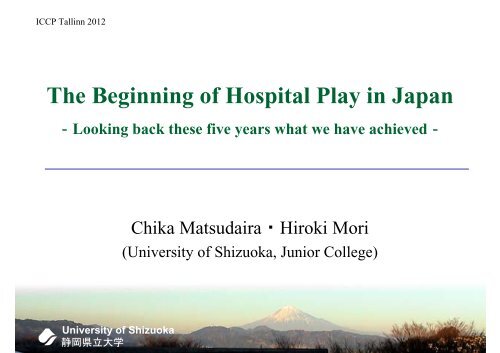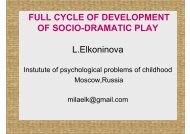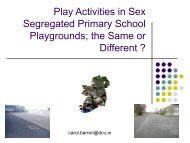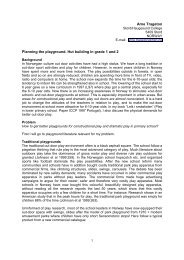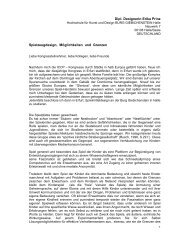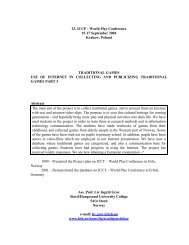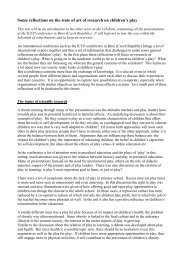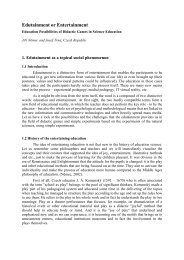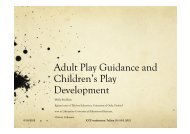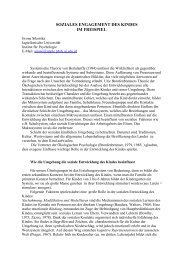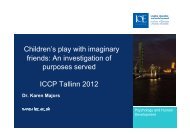Professor Chika Matsudaira
Professor Chika Matsudaira
Professor Chika Matsudaira
Create successful ePaper yourself
Turn your PDF publications into a flip-book with our unique Google optimized e-Paper software.
ICCP Tallinn 2012<br />
The Beginning of Hospital Play in Japan<br />
‐ Looking back these five years what we have achieved ‐<br />
<strong>Chika</strong> <strong>Matsudaira</strong> ・ Hiroki Mori<br />
(University of Shizuoka, Junior College)<br />
University of Shizuoka<br />
静 岡 県 立 大 学
1. What is Hospital Play…?<br />
‣ For children, play is the most familiar presence, and the quality of<br />
play is tied to the growth and development of all children. It is not<br />
an exception even for sick children, Hospital play is exactly, there<br />
is a role convey the power of play and value in child health care.<br />
University of Shizuoka<br />
静 岡 県 立 大 学
Definition of Hospital Play<br />
(1) Hospital Play is Play for children who are sick and who will live with<br />
continually medical condition.<br />
(2) Hospital Play is Play for children who are sick and have disabilities to<br />
make their medical experiences more positive to protect their personalities<br />
and to give them safety, control and trust.<br />
(3) Hospital Play is Play for medical staff to understand not only children’s<br />
medical condition but their feelings and emotion to their condition.<br />
(4) Hospital Play is Play to advocate sick children’s right which can easily<br />
be violated by the name of saving the child’s life.<br />
University of Shizuoka<br />
静 岡 県 立 大 学
2. Do we all know about how children in Hospital are treated?<br />
I don’t think so…<br />
We think we know about children but do we know about<br />
sick children who are treated in Hospitals.<br />
< How are sick children treated in Japanese Hospitals…? ><br />
>Limited hours for parents to meet their child/<br />
Restraint during procedures/No parents while treatment/<br />
Hardly any Play<br />
→ Not enough understanding of who children are.<br />
University of Shizuoka<br />
静 岡 県 立 大 学
3. Japanese recognition to play<br />
Question towards doctors and nurses in Japan. Play is<br />
children’s right. Why cannot children who are sick play?<br />
> Because they are sick not healthy. Play is for healthy children<br />
who can move note for children they are too sick.<br />
< Why is it like this…? ><br />
Medicine and Play is in Scale/Medicine is seen a very serious<br />
matter but Play/No teaching of Play in Japanese medical universities<br />
/Doctors and Nurses don’t know about Play/Medical Staff are<br />
treating the sickness and not the sick child.<br />
University of Shizuoka<br />
静 岡 県 立 大 学
4. What is the mission of Hospital Play Specialist (HPS)..?<br />
Hospital Play Specialist will help the child by play during their<br />
stay in Hospital and their experience with medicine.<br />
More and more children will be treated at home but that can cause<br />
strong stress to the child because home is no longer a safe place.<br />
HPS in Japan are providing home visits as well.<br />
University of Shizuoka<br />
静 岡 県 立 大 学
The Mission of Hospital Play Specialist<br />
(1) HPS will try to provide Play to all children no matter their condition are.<br />
(2) By using the healing power of Play, HPS will support the children who are treated with medicine.<br />
(3) HPS will prepare the child with Play so that they will not lose their sense of control while been<br />
treated.<br />
(4) HPS will support the child during procedures with Play so that<br />
the child will not feel pain or fear more than they need.<br />
(5) HPS will support the child with Play after the procedure so that the child can reflect on what<br />
happened.<br />
(6) HPS will make a individual Play Program so that sick children will continue to develop.<br />
(7) HPS will support the siblings of the sick child so that siblings will<br />
still feel that they belong to the family.<br />
(8) HPS will feed their information about the sick child to other medical staff<br />
and work within the pediatric team.<br />
(9) HPS will support the child’s life for their traumatic experience will live with them<br />
throughout their lives. Supporting a sick child is to make a social included adult in the future.<br />
(10) HPS will effort to make the society understand more about the meaning of Play.<br />
University of Shizuoka<br />
静 岡 県 立 大 学
5. HPS Program in Japan<br />
University of Shizuoka Junior College has been granted by the Japanese Ministry of Education to<br />
train Hospital Play Specialist Japan since August 1 st , 2007. This education Program has been carried<br />
about with Japanese educationalist and with the cooperation of National Association of Hospital Play<br />
and Hospital Play Staff Education Trust of UK. Each year we have been training approximately 15 to<br />
become an HPS.<br />
Cohort period<br />
applicants students graduates auditor<br />
hours(h)<br />
First<br />
Cohort<br />
Second<br />
Cohort<br />
Third<br />
Cohort<br />
Fourth<br />
Cohort<br />
Fifth<br />
Cohort<br />
Sixth<br />
Cohort<br />
Seventh<br />
Cohort<br />
2008.2.25~<br />
2008.3.24<br />
2008.9.1~<br />
2008.10.9<br />
2009.2.16~<br />
2009.3.19<br />
2009.9.7~<br />
2009.10.13<br />
2010.2.15~<br />
2010.3.18<br />
2010.11.30~<br />
2011.3.18<br />
2011.11.1~<br />
2012.3.9<br />
10 10 8 8 145.5<br />
34 15 15 8 155<br />
17 12 12 16 156.5<br />
30 13 13 22 155<br />
29 14 14 17 156<br />
28 13 11 13 211<br />
41 16 16 11 213<br />
Total<br />
189 93 89 95 -<br />
University of Shizuoka<br />
静 岡 県 立 大 学
University of Shizuoka<br />
静 岡 県 立 大 学
University of Shizuoka<br />
静 岡 県 立 大 学
6. As a member of the pediatric care team…<br />
>The difficulty our graduates have faced in establishing Play<br />
in Hospital;<br />
The staff lack of understanding the importance of Play. Also<br />
the HPS themselves found it difficult to speak the value of<br />
play for sick children to pediatricians.<br />
Medical environment and staff seek for too much safety so<br />
nothing new can come in.<br />
Medical staff emphasis much on what they have to do on<br />
time and small flexibility.<br />
University of Shizuoka<br />
静 岡 県 立 大 学
Overall Structure of Hospital Play Specialist<br />
>HPS are the advocators of the need of Play in Hospitals. To place an HPS in the pediatric<br />
team and to make a multidisciplinary team will make the care richer and satisfaction of the<br />
sick child and family will increase. Family Centered Care will be achieved.<br />
University of Shizuoka<br />
静 岡 県 立 大 学
7. Change in Japan‐Result of Hospital Play<br />
Activity‐<br />
Small but positive change is happening since 2007 in Japan. Children’s<br />
welfare and children’s right to play is understood more and medical staff<br />
are using Play as a media to connected to the child. More and more sick<br />
children have chances to express their feelings through play.<br />
(1) Change in every day<br />
University of Shizuoka<br />
静 岡 県 立 大 学
(2) Change in Playroom<br />
University of Shizuoka<br />
静 岡 県 立 大 学
(3) Change in treatment room<br />
(4) Change in a blood sample<br />
University of Shizuoka<br />
静 岡 県 立 大 学
8. Conclusion and Future<br />
1. Use the power of play and make it easier not just for the child but<br />
for the staff who treat.<br />
2. Make trust between the doctor and child so that he can participate<br />
in the treatment.<br />
3. To promote play for more understanding in the society and in the<br />
field of medicine.<br />
4. More universities to run the HPS course in Japan for all the<br />
children in Japan.<br />
University of Shizuoka<br />
静 岡 県 立 大 学
Appendix: Smile Project by Hospital Play Specialist after the Tsunami Attack<br />
Every Child Matters<br />
University of Shizuoka<br />
静 岡 県 立 大 学


